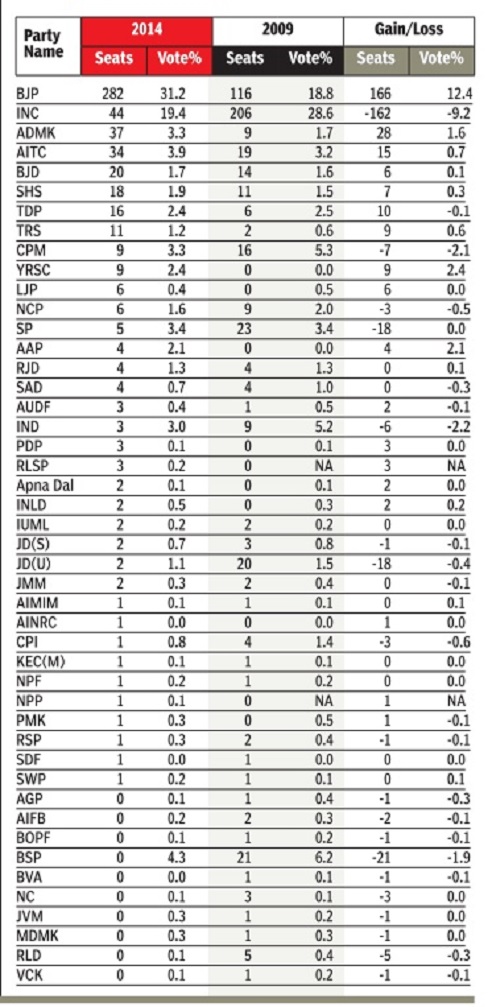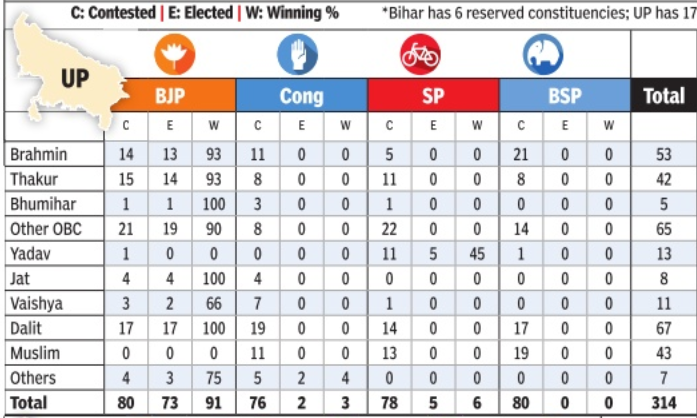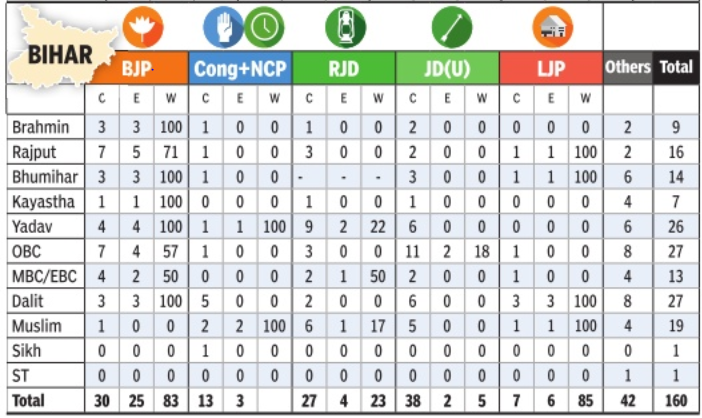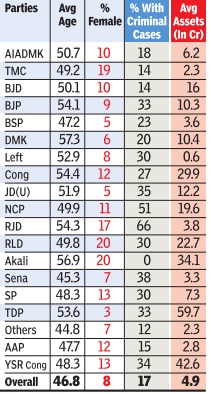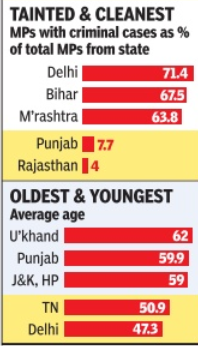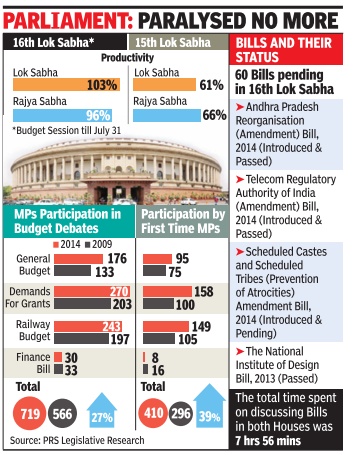The 16th Lok Sabha (2014-19): trends
(→Expenditure of political parties) |
|||
| Line 86: | Line 86: | ||
As per rules, political parties are required to file their election expenditure statements within 75 days of assembly elections while the deadline in case of Lok Sabha polls is 90 days. | As per rules, political parties are required to file their election expenditure statements within 75 days of assembly elections while the deadline in case of Lok Sabha polls is 90 days. | ||
| + | |||
| + | ===Mismatch been candidates’ and parties’ figures=== | ||
| + | [http://epaperbeta.timesofindia.com/Article.aspx?eid=31808&articlexml=Election-expenses-Filing-by-parties-candidates-including-PM-18092015013020 ''The Times of India''], Sep 18 2015 | ||
| + | [[File: Maximum number of discrepencies in declarations, Congress, BJP and CPM.jpg|Maximum number of discrepencies in declarations, Congress, BJP and CPM; Graphic courtesy: [http://epaperbeta.timesofindia.com/Article.aspx?eid=31808&articlexml=Election-expenses-Filing-by-parties-candidates-including-PM-18092015013020 ''The Times of India''], Sep 18 2015|frame|500px]] | ||
| + | |||
| + | Himanshi Dhawan | ||
| + | |||
| + | '''Election expenses: Filing by parties, candidates, including PM, don't match''' | ||
| + | |||
| + | Election expenses of several candidates did not match their party's expenditure declaration according to an analysis by Association for Democratic Reforms (ADR). Among those whose election expenses were either more or less than the expense declaration made by the party included PM Narendra Modi, senior BJP functionary L K Advani, Cabinet minister Kalraj Mishra, LJP's Ramvilas Paswan, NCP's Supriya Sule, Congress MPs Deepender Singh Hooda and K V Thomas among others. | ||
| + | |||
| + | Also, around 70 parliamentarians including Speaker Sumita Mahajan, ministers Uma Bharati, Maneka Gandhi and Jayant Sinha claimed to have received party funds though the party has not declared any expenses towards their campaign. | ||
| + | |||
| + | Out of 342 MPs from national parties, 263 claimed they received poll funds to the tune of Rs 75.58 crore from their parties while the parties declared that they had given a much lower amount of Rs 54.73 crore to only 175 MPs. | ||
| + | |||
| + | The analysis is based on election expenditure statements submitted to the Election Commission by the parties and individual candidates. The discrepancy in data, according to ADR, points to lack of scrutiny of election expenses by the EC. The discrepancy is most pronounced in BJP where the party declared that it had provided aid to 159 parliamentarians allocating a total of Rs 47.03 crore. Of these, 18 MPs claimed to have received less than the party declared as expenses towards their campaign. They included PM Narendra Modi whose affidavit claimed the party gave him Rs 32.53 lakh while the party expenditure statement declared Rs 40 lakh as the fund amount. | ||
| + | |||
| + | Similarly , Advani declared Rs 33.88 lakh as opposed to the party declaration of Rs 41 lakh. A senior EC official told TOI that the commission has taken note of the ADR findings. | ||
| + | |||
=The 16th Lok Sabha: Socio-economic composition= | =The 16th Lok Sabha: Socio-economic composition= | ||
==Background check of MPs== | ==Background check of MPs== | ||
Revision as of 14:45, 19 September 2015
These are newspaper articles selected for the excellence of their content.
|
Contents |
The 2014 elections: electioneering and the verdict
Seats lost or gained in 2014 vis-a-vis 2009
See the graphic: 'Seats lost or gained in 2014 vis-a-vis the 2009 election'
Source: The Times of India
Victory margins in 2009 and 2014
See the chart 'Victory margins in 2009 and 2014'Source: The Times of India
Percentage of votes obtained by winning candidates
LS winners got average of 47% votes: ADR
New Delhi: TIMES NEWS NETWORK
The Times of India Jun 05 2014
This is one race that PM Narendra Modi lost. BJP’s Darshnaben Jardosh from Surat constituency pipped Modi to the post by winning her seat with a vote share of 76%. Jardosh was followed by Modi who won the Vadodara constituency with 73% of the votes polled while Chandrakant Patil from Navsari constituency won with 71% of votes polled.
According to data analysed by Association for Democratic Reforms (ADR), the winners of the Lok Sabha elections garnered an average of 47% of votes polled compared to 44% in the 2009 polls.
Out of 282 winners of BJP, 142 (50%) won with less than 50% of votes polled in their constituency while 37 (84%) out of 44 winners from Congres, 30 (81%) out of 37 winners from AIADMK, 28 (82%) out of 34 winners from Trinamool Congres, 13 (65%) out of 20 winners from BJD and 6 (33%) out of 18 winners from Shiv Sena won with less than 50% of votes polled in their constituency.
The MPs who won with less than 30% of the vote share included Ladakh MP from BJP Thupstan Chhewang who won with 26%, Congres’s Ravneet Singh Bittu from Ludhiana who won with 27% and Azmeera Naik, Mahabubabad from TRS with 29% of the vote and CPM’s Mohammed Salim with 29% of the vote.
Caste and the 16th Lok Sabha
THE HINDI HEARTLAND'S CASTE IN STONE
The Times of India May 19 2014
We like to think of ourselves as global citizens who are part of an emerging economic superpower. But the reality is that politics in several parts of India is still mired in caste and religion. Identity politics lurks below the surface when it's not front and centre. Perhaps nowhere no more so than in UP and Bihar, which with 120 seats between them, account for close to a quarter of total Lok Sabha seats. Candidates are often chosen on the basis of whether they are Dalit or OBC or Thakur or Bhumihar or Brahmin or Muslim.
TOI reporters in UP and Bihar combed through the entire list of candidates of the major contenders in each state to ascertain their caste and religious status. There are a mind-boggling array of castes: From Dusadh, Jatav, Dom, Pasi and Musahar (all SC/Dalit), to Koeri, Yadav, Dhanuk, Kurmi and Barhai (all OBC), to Kahar, Mallah, Gangota and Tanti (all EBC or Extremely Backward Castes, somewhere between SC and OBC), to the upper caste Rajputs, Bhumihars, Kayasths and Brahmins. For reasons of space and convenience, we've clubbed into a smaller handful of groups.
UP and Bihar aren't the only states where caste politics plays a big role: It's there in Andhra, Tamil Nadu, Karnataka, Punjab, Haryana, Rajasthan, and Maharashtra (a reason for Ashok Chavan's resurrection despite the taint of Adarsh is that he's a Maratha). And if it's not caste, it's religion. But nowhere does it cast such a long and imposing shadow, and over such a huge block of seats, as the two `heartland states'. We analysed the `strike rates' of the different castes in the two states
Muslims
See chart: ‘Muslims/ Minorities’
Women
UP, BENGAL TOP LIST OF WOMEN MPs
The Times of India May 19 2014
One-third of West Bengal's MPs are women while states like K'taka, Rajasthan, Kerala and Punjab have just one MP each.
Tamil Nadu, also headed by a woman CM, elected only 4 MPs
See graphic: ‘Women’
Expenditure of political parties
Jan 17 2015
BJP spent Rs 714cr, Congress Rs 516cr during 2014 polls
BJP and Congress spent Rs 1,230 crore between them on campaigning for the 2014 elections to the Lok Sabha and three state assemblies. While BJP ran a poll expenditure of over Rs 714 crore during the April-May exercise, Congress had a bill of Rs 516 crore on its countrywide campaign.
The two leading national parties filed their expenditure statements well beyond the August 26 deadline. Congress declared its poll expenses to the EC on December 22 while BJP was the last national party to do so, filing its election expenditure statement only on January 12.
According to the latest data uploaded on the EC website, BJP and Congress's expenditure in the 2014 Lok Sabha and assembly elections (Andhra Pradesh, Odisha and Sikkim) far surpassed the spending by other recognised national parties like NCP (over Rs 51 crore) and BSP (more than Rs 30 crore).
The EC had, on November 28 last year, issued showcause notices to BJP, Congress and 18 other parties over the delay in filing expenditure statements for the general polls.
According to EC data, Nationalist Congress Party (NCP) spent Rs 51.34 crore in these polls followed by Bahujan Samaj Party (BSP) with an expenditure of Rs 30.05 crore. CPI (Marxist) incurred an expenditure of Rs 18.69 crore.
The EC has not shared the expenditure made in this regard by CPI even though it said the party had submitted the relevant information to it on September 15, 2014.
The commission had also warned these parties that it would withdraw their recognition if the statements were not filed and sent to it.
As per rules, political parties are required to file their election expenditure statements within 75 days of assembly elections while the deadline in case of Lok Sabha polls is 90 days.
Mismatch been candidates’ and parties’ figures
The Times of India, Sep 18 2015
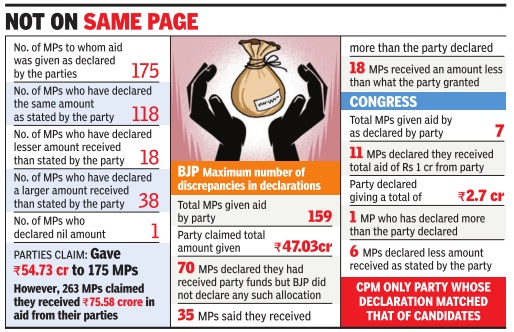
Himanshi Dhawan
Election expenses: Filing by parties, candidates, including PM, don't match
Election expenses of several candidates did not match their party's expenditure declaration according to an analysis by Association for Democratic Reforms (ADR). Among those whose election expenses were either more or less than the expense declaration made by the party included PM Narendra Modi, senior BJP functionary L K Advani, Cabinet minister Kalraj Mishra, LJP's Ramvilas Paswan, NCP's Supriya Sule, Congress MPs Deepender Singh Hooda and K V Thomas among others.
Also, around 70 parliamentarians including Speaker Sumita Mahajan, ministers Uma Bharati, Maneka Gandhi and Jayant Sinha claimed to have received party funds though the party has not declared any expenses towards their campaign.
Out of 342 MPs from national parties, 263 claimed they received poll funds to the tune of Rs 75.58 crore from their parties while the parties declared that they had given a much lower amount of Rs 54.73 crore to only 175 MPs.
The analysis is based on election expenditure statements submitted to the Election Commission by the parties and individual candidates. The discrepancy in data, according to ADR, points to lack of scrutiny of election expenses by the EC. The discrepancy is most pronounced in BJP where the party declared that it had provided aid to 159 parliamentarians allocating a total of Rs 47.03 crore. Of these, 18 MPs claimed to have received less than the party declared as expenses towards their campaign. They included PM Narendra Modi whose affidavit claimed the party gave him Rs 32.53 lakh while the party expenditure statement declared Rs 40 lakh as the fund amount.
Similarly , Advani declared Rs 33.88 lakh as opposed to the party declaration of Rs 41 lakh. A senior EC official told TOI that the commission has taken note of the ADR findings.
The 16th Lok Sabha: Socio-economic composition
Background check of MPs
Extremes
A HOUSE OF EXTREMES
The Times of India May 19 2014
On results day, The Times of India profiled the 16th LS, in terms of the age, gender, assets of MPs & criminal cases pending against them. The day after, The Times of India brought you a party-wise breakup. Today, find out which states sent the richest and oldest MPs, most women and criminals |
See the two graphics: EXTREMES 1 and EXTREMES 2
The avocations of MPs
Rahul a 'strategy consultant', Modi a 'social worker'
Mohua Chatterjee, The Times of India TNN | Jul 30, 2014
West Bengal Congres chief and MP from Baharampur Adhir Ranjan Choudhury may have had a number of criminal cases registered against him, but he lists his profession as "social reformer," according to the Parliament website.
Rahul Gandhi's strategies may not have worked for the Congres in last elections, but in his declaration to the Lok Sabha, the Congres vice-president does not shy away from listing himself as a "strategy consultant".
The profession-wise list of 539 members of the 16th Lok Sabha offers an interesting peek into how our netas prefer to project their identities beyond politics.
The Parliament website lists 33 categories of professions ranging from agriculturists to builders, medical practitioners to educationists, teachers to sportsperson, artists to industrialists and religious missionaries to social reformers.
BJP veteran L K Advani's name figures in the category of "journalists". The party patriarch, an avid blogger, began his professional life with the R S S journal 'Organiser'. Among the other four journalists in LS are BJD's Bhartruhari Mahtab and Tathagata Satpathy. External affairs minister Sushma Swaraj and Speaker Sumitra Mahajan are listed as "advocates" by profession.
Home minister Rajnath Singh calls himself a "teacher". But his party senior Murli Manohar Joshi is registered as "professor". Giving him company is first-time MP Sanjeev Baliyan, whose name incidentally is linked to the Muzaffarnagar riots.
While Congres president Sonia Gandhi is a "political and social worker", Union minister Maneka Gandhi prefers to identify herself as a "writer", probably because she has quite a few published works to her credit.
Indian Test cricketer Kirti Azad has preferred to identify himself as the only one in the "sportsperson" category, while young MP Anurag Thakur is the only one to prefer the "cricketer" tag.
The House has four people registered as "builders," nine "artists" and seven "film artistes". If first-time MP Poonam Mahajan identifies herself as "businessperson", TMC MP Saugata Roy prefers the "educationist" tag.
BJP MP Yogi Adityanath is the only "religious missionary" in the House and Shashi Tharoor the only one to identify himself as a "diplomat".
The wealth of parliamentarians
THE RICH LIST
The Times of India May 19 2014
TOI had carried the overall and party-wise average age and assets of MPs, pending criminal cases against them and the percentage of women MPs in the 16th LS. Here's the state-wise break-up in the graphic 'Average assets'
2014
Budget session
Productivity of LS climbs to 103%
Himanshi.Dhawan @timesgroup.com The Times of India Aug 02 2014
Much like in government, the winds of change are blowing in the corridors of Parliament. After a deadlock of nearly three years, there is a flurry of activity on the floor of the two Houses. In the last three weeks, the 16th Lok Sabha recorded a productivity of 103% as discussions went past allotted hours, in contrast to the 15th Lok Sabha that worked for only 61% of the scheduled time.
Even if only Budget sessions are considered, the productivity of the LS is up steeply from 49% in 2013.
It is the first-time lawmakers who are leading the charge. In 2014, participation of first-time MPs in the debate on demand for grants increased by 58% with 158 firsttimers speaking on the subject as compared to 100 in 2009.
Analysis by independent body PRS Legislative Research shows a 41% increase in participation by new MPs in the railway budget discussion.
Interest in the general budget was also high, with 26% more participation by legislators in 2014 as opposed to 2009.
In all, participation by first-timers was up 38.5% compared to veterans whose participation increased by 27% between 2009 and 2014. There are 314 first-time MPs in this Parliament, up from 302 in 2009.
While it is early days yet, there is reason to believe this is not a flash in the pan. Organizations such as PRS and Swaniti that work closely with parliamentarians say they find greater awareness and accountability among legislators.
Winter session
The Times of India Dec 24 2014 Lok Sabha worked for 98% of winter session Himanshi Dhawan The most productive winter session for the Lok Sabha so far was in 2004 when it had worked for 101% of the scheduled time. BJP's strong majority in the LS has meant smooth sailing for the party but its According to data analysed by PRS Legislative Research, the LS spent 44% of its productive time on discussing various issues, 35% on legislation and 14% on answering questions.
`Bid To Focus On Godse's Ideology'
After announcing its plans to build a temple to Nathuram Godse in Sitapur, the Akhil Bharat Hindu Mahasabha (ABHM) has decided to mark January 30, observed as Martyrs Day, as ‘shaurya divas’. Godse had assassinated Mahatama Gandhi on that day in 1948.
Observing ‘shaurya diwas’ on January 30 is an attempt to bring forth Nathuram Godse’s ideology, said Kamlesh Tiwari, working president of the Akhil Bharat Hindu Mahasabha.
On December 23, TOI had reported the Hindu Mahasabha’s plans to build a temple dedicated to Godse. Some Hindu Mahasabha members want to perform ‘bhumi pujan’ of the temple on January 30. But Tiwari told TOI the ceremony would in all likelihood be performed between February 15 and February 25. The organization will observe `shaurya divas' in 20 cities throughout the country , Tiwari said. The cities include Mumbai, Aurangabad, Thane, Pune, Hyderabad, Indore, Gwalior, Ahmedabad, Anand, Surat, New Delhi, Lucknow, Gorakhpur, Bareilly and Sitapur.
On the day, members of the Hindu Mahasabha will assemble in parks and community centres, put up a photograph of Godse and hold a garlanding ceremony , said Tiwari, who represents the Hindu Mahasabha in the Ram Janmabhumi dispute case. He said so far Godse was known as Gandhi’s killer, and even the Hindu Mahasabha did not support killing. “But people should understand that Godse didn’t kill Gandhi for his personal interest,” said Tiwari. The Hindu Mahasabha will also demand that the court proceedings of Godse’s trial be made public and the government stops identifying him as a traitor, Tiwari said.
2015
Budget session: high productivity
The Times of India, Mar 21 2015
Lok Sabha sees 10-yr-high productivity this session
Himanshi Dhawan
Lok Sabha members worked harder than their predecessors in the last decade with the just-concluded budget session registering productivity of 121%.Despite disruptions and adjournments the House of Elders also did not fare too badly notching productivity of 109%, only second to the 2009 budget session. The data compiled by independent think-tank, PRS Legislative Research, reveals that this LS session surpassed the monsoon session in 2005 that worked for 110% of the time, while the highest productivity for RS has been in the 2009 budget session that worked for 113% of the scheduled time. Productivity is considered on the number of hours the House sits as compared to the number of hours scheduled.
Question Hour in Rajya Sabha functioned for 98% of the scheduled time while Lok Sabha members were able to get responses 88% of the time. The lowest productivity in the last 10 years has been in winter session of 2010 when the LS worked for merely 6% of the time and the RS worked for 2% of the time.
Official data from the parliamentary affairs ministry is also flattering: The LS worked for 123.45% of the time, working an additional 23 hours 45 minutes while the RS registered productivity of 106.79%.Among the significant bills that have passed include the Insurance Laws (amendment) bill, Motor Vehicles (amendment) bill and Citizenship (amendment) bill. Commenting on the passing of mines and minerals bill and the coal mines bill that replace ordinances parliamentary affairs minister M Venkaiah Naidu said, “The Parliament has enabled the beginning of a new era of transparent governance in the country by ending the government's discretion in allocation of minerals which has come to be a cesspool of corruption and malpractices.
Monsoon session
Barricades erected
The Times of India, Aug 13 2015
In a first, barriers erected in LS
Barricades were put up on either side of the secre tary general's table in the Lok Sabha on Wednesday , blocking members from accessing the Speaker's chair. The move came after nearly three weeks of unruly protests where opposition members, led by Congress, used placards to block the Speaker's vision. Members were also seen climbing on the low platform that was meant for the secretary general's chair and leaning on it. This is probably the first time that a portion of the House has been fenced. Besides sloganeering and holding placards in front of the Speaker's chair, banging placards on the Speaker's table, members also tore paper and flung bits around, forcing adjournments.`Incensed' Sonia troops into well, stuns all: “Kya... kya kaha... what did he say about me?“ This is how Congress chief Sonia Gandhi reacted to a caustic accusation about a family member hurled by BJP parliamentarians. The provocation for saffron members was Mallikarjuna Kharge's comment that Lalit Modi had a strong business relationship with Rajasthan CM Vasundhara Raje, a fact he repeated many times despite the Speaker's observa tion that a non-mem ber could not be named in Lok Sabha.
Sonia took serious objection to the personal insinuation and walked into the well, standing right in front of the Speaker's chair and protesting vigorously . In tow were Congress MPs appearing equally offended. As the confrontation flared, the Speaker adjourned the House. Sonia was then surrounded by colleagues in deep discussion for some time before lunch.Sonia rushing into the well surprised everyone, with an MP saying, “It is another first in Parliament history...first time Sonia going into the well.“
Productivity of LS and Rajya Sabha

Aug 14 2015
Himanshi Dhawan
RS worked for only 9% of allotted time
In total washout, only 1 Bill passed in session
Only one legislation was passed by Parliament during the 17-day monsoon session with Rajya Sabha working for barely 9% of the allotted time, only marginally up from the infamous winter session of 2010 when the House functioned for just 2% of the time. Lok Sabha, aided by the explusion of 25 Congress members for five days, managed to work for almost half the time (48%) allotted to it. The Delhi high court (amendment) bill 2014 was the only bill -excluding money bills--to have been passed by both Houses. According to Parliament data, the Lower House lost 47 hours and 27 minutes, the Upper House lost 82 hours to disruptions with important legislations like the land acquisition bill, GST bill and whistleblowers protection bill getting delayed.
The session witnessed the lowest number of bills being passed in the last five years. This productivity is in sharp contrast to the budget session this year, which was the most productive session in the last 15 years. During the last session, RS had a productivity of 101%.
As a result of continuous disruptions during Question Hour, only 2% of questions were answered orally while only 1% of the time was spent on legislative business in RS.
In comparison, LS spent 17% of its productive time on legislative business, and 45% on non-legislative business. About 13% of questions were answered orally during Question Hour.Three bills including the Negotiable Instruments (amendments) bill 2015, SC and ST (prevention of atrocities) bill 2014 and Repealing and Amending (fourth) bill 2015 were passed in LS but were discussed for less than three hours, says analysis by PRS Legislative Research.
Despite a lame duck session, the performance of individual parliamentarians was enthusiastic. PRS data show that overall attendance was as high as 75%. Attendance in LS was at 84%, while in RS it was at 78%. In LS, the highest participation was seen in MPs between 56 to 70 years of age. A LS MP participated in about 20 debates on average. However, 48 MPs (9%) from that House did not participate in any debates, of which 27 were first time MPs. Among parties with more than 10 MPs, Shiv Sena MPs had high participation, with 25 debates on average for each MP. This was followed by BJD and Congress, with about 20 debates per MP.
See also
The 15th Lok Sabha: 2009-14/ The 16th Lok Sabha (2014- ): MPs complete list of MPs / The 16th Lok Sabha (2014- ): trends
